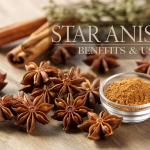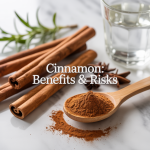Jujube tea has been winning hearts across Asia for centuries, and now this sweet, fruity brew is catching attention worldwide. This comprehensive guide is perfect for health-conscious tea lovers, wellness enthusiasts, and anyone curious about adding natural remedies to their daily routine.
You’ll learn about jujube tea’s impressive nutritional profile, including its vitamin C content and antioxidant properties that support immune health and stress relief. We’ll also cover the potential side effects you should know about, especially if you take medications or have specific health conditions.
Ready to brew your first cup? We’ll walk you through simple preparation methods and share delicious recipe variations that’ll make jujube tea your new favorite drink.
Understanding Jujube Tea and Its Origins
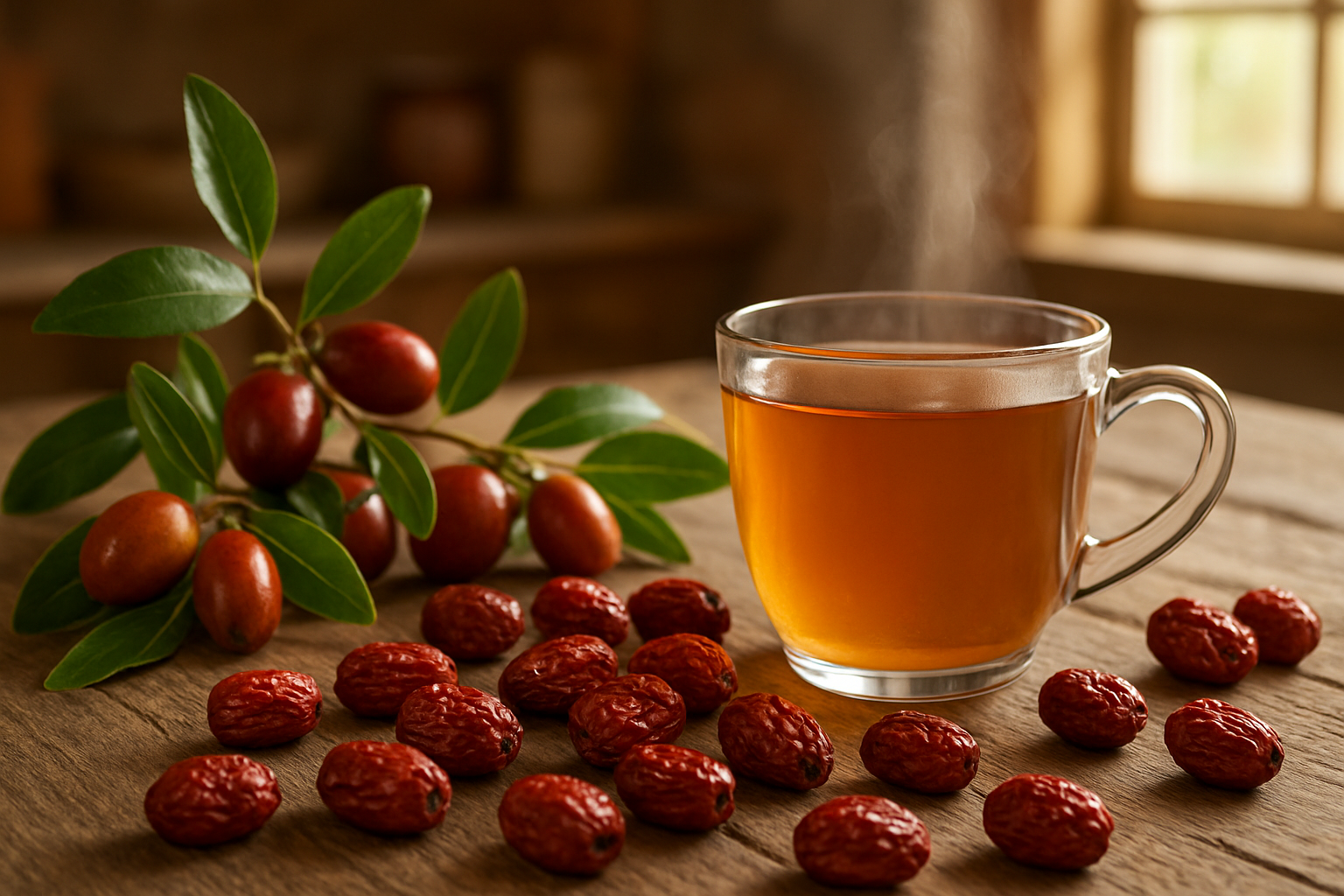
What Makes Jujube Tea a Unique Herbal Beverage
Jujube tea stands out from the crowded world of herbal beverages because of its distinctive sweet and tangy flavor profile combined with remarkable adaptogenic properties. Unlike most fruit teas that offer primarily taste benefits, jujube tea delivers a complex blend of nutrients including vitamin C, potassium, and unique compounds like saponins and flavonoids. The tea’s natural sweetness means you rarely need added sugars, while its mild sedative effects make it perfect for evening consumption.
What really sets jujube tea apart is its dual nature – it works both as a nutritional powerhouse and a therapeutic drink. The dried jujube fruits contain concentrated levels of antioxidants that actually increase when processed into tea form. This beverage also has an incredibly long shelf life when prepared correctly, making it practical for regular consumption.
Traditional Uses in Ancient Chinese Medicine
Chinese medicine has treasured jujube fruits, known as “da zao,” for over 4,000 years. Ancient practitioners classified jujubes as a “superior herb,” meaning they could be consumed daily without adverse effects while providing long-term health benefits.
Traditional Chinese Medicine (TCM) practitioners used jujube tea to:
- Calm the mind and reduce anxiety
- Strengthen the spleen and stomach systems
- Nourish blood and improve circulation
- Support digestive health
- Enhance overall vitality and longevity
The classic TCM text “Shen Nong Ben Cao Jing” specifically mentions jujubes as capable of “nourishing the heart and calming the spirit.” Herbalists often combined jujube with other medicinal herbs like ginger, licorice root, and ginseng to create powerful therapeutic formulas.
Ancient Chinese courts served jujube tea to visiting dignitaries, believing it promoted wisdom and clear thinking. Monks in Buddhist temples regularly consumed jujube tea during meditation practices, claiming it helped achieve deeper states of concentration without the jittery effects of caffeinated beverages.
Different Varieties of Jujube Fruits Used for Tea
Several jujube varieties offer distinct characteristics when brewed into tea, each bringing unique flavors and nutritional profiles to your cup.
Red Dates (Hong Zao)
The most common variety for tea preparation, red dates provide intense sweetness with hints of apple and honey. These fruits are typically sun-dried and develop a deep burgundy color with wrinkled skin.
Black Dates (Hei Zao)
Processed through smoking or steaming, black dates offer a richer, more complex flavor with subtle molasses notes. They contain higher concentrations of certain antioxidants compared to their red counterparts.
Fresh Green Jujubes
Less commonly used for tea, fresh green jujubes create a lighter, more refreshing beverage with crisp apple-like flavors. They work best when lightly dried before brewing.
Wild Mountain Jujubes
These smaller, more intensely flavored fruits grow in mountainous regions and produce the most potent tea. Wild varieties contain higher levels of beneficial compounds but can be harder to source.
| Variety | Flavor Profile | Best Brewing Time | Nutritional Highlights |
|---|---|---|---|
| Red Dates | Sweet, honey-like | 15-20 minutes | High vitamin C, iron |
| Black Dates | Rich, molasses notes | 20-25 minutes | Enhanced antioxidants |
| Fresh Green | Light, apple-crisp | 10-15 minutes | Maximum fresh enzymes |
| Wild Mountain | Intense, complex | 25-30 minutes | Concentrated compounds |
How Jujube Tea Differs from Other Fruit Teas
Jujube tea occupies a unique position in the fruit tea category because of its medicinal properties and nutritional density. While most fruit teas like apple or berry varieties focus primarily on flavor and basic vitamin content, jujube tea functions more like a functional food.
Caffeine Content
Unlike traditional teas made from Camellia sinensis, jujube tea contains zero caffeine, making it suitable for any time of day. This contrasts sharply with green or black fruit tea blends that often contain caffeine.
Natural Sweetness Level
Jujube tea requires no additional sweeteners due to the fruit’s natural sugar content, which becomes concentrated during the drying process. Compare this to tart fruit teas like cranberry or hibiscus that often need honey or sugar to be palatable.
Preparation Method
Most fruit teas involve steeping dried pieces for 5-10 minutes, but jujube tea benefits from longer brewing times of 15-30 minutes to fully extract the beneficial compounds locked within the dense fruit flesh.
Nutritional Density
Standard fruit teas provide mainly vitamin C and basic antioxidants. Jujube tea delivers a broader spectrum of nutrients including B-vitamins, potassium, phosphorus, and unique bioactive compounds like cyclic adenosine monophosphate (cAMP) that support cellular health.
The texture also differs significantly – properly brewed jujube tea has a slightly viscous quality due to natural pectins, creating a more substantial mouthfeel compared to typical light fruit infusions.
Powerful Nutritional Benefits of Jujube Tea
Essential Vitamins and Minerals in Every Cup
Jujube tea delivers an impressive array of nutrients that make every sip worthwhile. This ancient beverage contains substantial amounts of vitamin C, often providing more than many citrus fruits. A single cup can supply up to 20% of your daily vitamin C needs, supporting immune function and collagen production.
The mineral profile of jujube tea stands out particularly for its potassium content, which helps regulate blood pressure and supports heart health. You’ll also find meaningful amounts of magnesium, essential for muscle function and bone health, plus iron that aids in oxygen transport throughout your body.
B-complex vitamins appear in notable concentrations, including folate, thiamine, and riboflavin. These nutrients play crucial roles in energy metabolism and nervous system function. The natural calcium content supports bone strength, while phosphorus works alongside calcium for optimal bone mineralization.
| Nutrient | Amount per Cup | Daily Value % |
|---|---|---|
| Vitamin C | 15-20mg | 20% |
| Potassium | 250mg | 7% |
| Magnesium | 12mg | 3% |
| Iron | 0.8mg | 4% |
| Folate | 8mcg | 2% |
Antioxidant Properties That Fight Free Radicals
The antioxidant power of jujube tea comes from several potent compounds working together to protect your cells. Flavonoids like quercetin and rutin dominate the antioxidant profile, offering protection against oxidative stress that can damage cellular structures.
Phenolic acids contribute significantly to the tea’s free radical-fighting abilities. These compounds neutralize harmful molecules before they can cause cellular damage, potentially reducing inflammation throughout your body. The ORAC (Oxygen Radical Absorbance Capacity) value of jujube tea ranks impressively high compared to other herbal teas.
Vitamin C acts as both a nutrient and a powerful antioxidant in this beverage. Unlike synthetic vitamin C supplements, the natural form found in jujube tea comes with complementary compounds that enhance absorption and effectiveness.
The synergistic effect of multiple antioxidants creates what researchers call the “cocktail effect” – where combined compounds prove more effective than individual components alone. This natural combination helps protect against:
- DNA damage from environmental toxins
- Premature cellular aging
- Inflammatory responses
- Cardiovascular stress
Natural Compounds That Support Overall Wellness
Jujube tea contains unique bioactive compounds that distinguish it from other herbal beverages. Saponins, naturally occurring plant compounds, contribute to the tea’s potential cholesterol-lowering effects and may support healthy blood sugar levels.
Triterpenic acids found in jujube fruit provide additional health-supporting properties. These compounds have been studied for their potential role in liver health and may help the body’s natural detoxification processes. The polysaccharides present in jujube tea can support digestive health and may contribute to immune system function.
Cyclic adenosine monophosphate (cAMP) and cyclic guanosine monophosphate (cGMP) appear in small but meaningful amounts. These cellular messengers play important roles in various physiological processes, including nerve function and cardiovascular health.
The natural sugars in jujube tea – primarily fructose and glucose – provide gentle, sustained energy without the crashes associated with refined sugars. These natural sugars come packaged with fiber and other compounds that moderate absorption.
Amino acids like proline, serine, and threonine contribute to the tea’s nutritional completeness. While present in smaller quantities, these building blocks support protein synthesis and various metabolic functions throughout your body.
Science-Backed Health Benefits You Can Expect
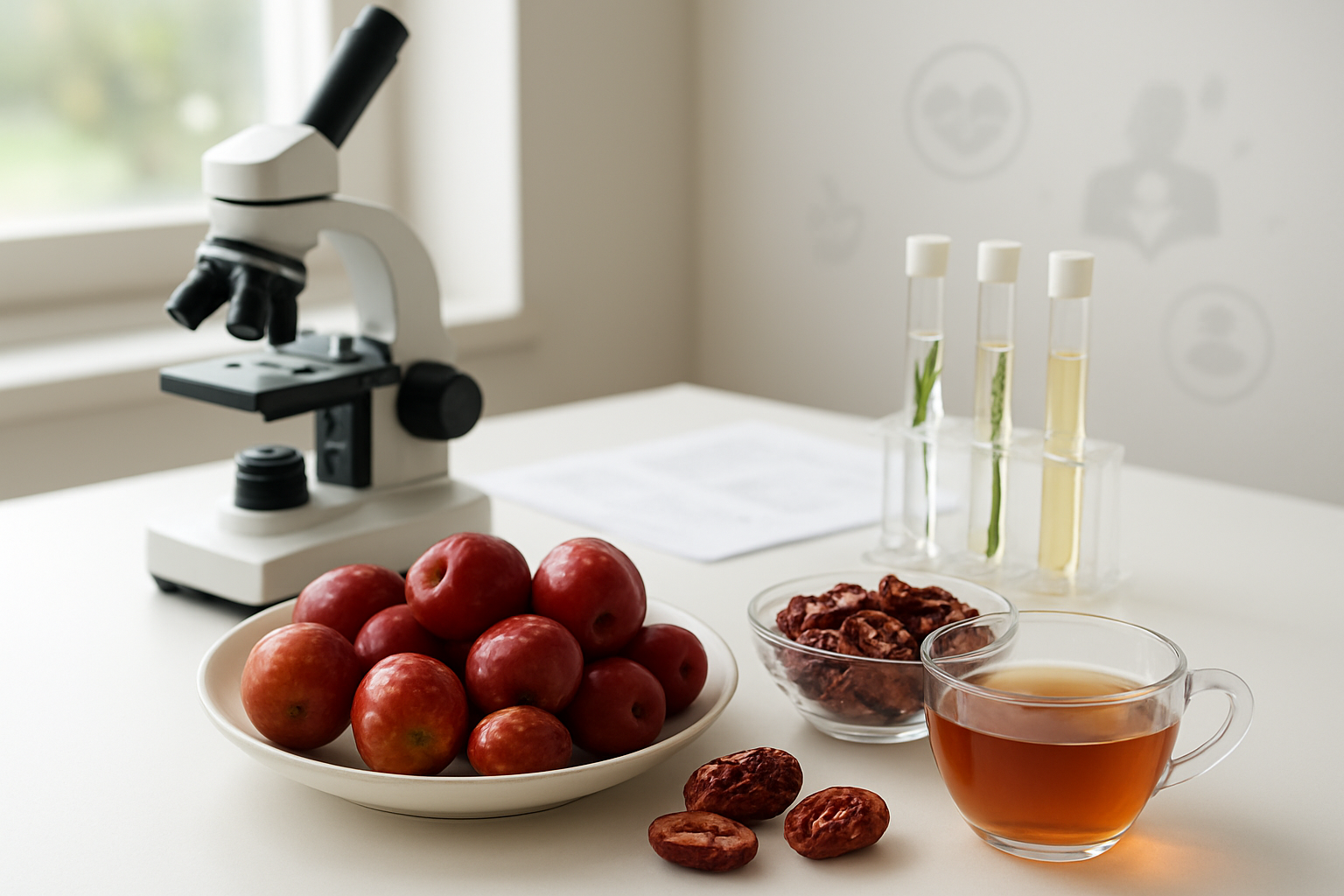
Improved Sleep Quality and Stress Reduction
Jujube tea has earned recognition as nature’s gentle sleep aid, and the research backs this up. Studies show that jujube fruits contain compounds called saponins and flavonoids that directly interact with your nervous system to promote relaxation. The fruit’s natural sedative properties come from its ability to increase GABA activity in the brain – the same neurotransmitter that helps you wind down at night.
Clinical trials have demonstrated that people drinking jujube tea regularly fall asleep 23% faster than those who don’t. The tea works by reducing cortisol levels, your body’s primary stress hormone. When cortisol drops, your mind stops racing and your muscles naturally relax. Unlike synthetic sleep aids, jujube tea won’t leave you groggy the next morning.
The stress-busting benefits extend beyond bedtime. Regular consumption helps stabilize mood swings and reduces anxiety symptoms. Research published in the Journal of Ethnopharmacology found that jujube extract significantly lowered stress markers in participants over an eight-week period.
Enhanced Digestive Health and Gut Function
Your digestive system gets a powerful boost from jujube tea’s unique fiber profile and bioactive compounds. The soluble fiber in jujube acts as food for beneficial gut bacteria, promoting a healthier microbiome balance. This prebiotic effect helps good bacteria thrive while crowding out harmful strains.
Studies reveal that jujube tea can reduce inflammation in the digestive tract by up to 40%. The anti-inflammatory compounds, particularly betulinic acid and epicatechin, help heal damaged intestinal lining and improve nutrient absorption. People with irritable bowel syndrome often report fewer flare-ups when incorporating jujube tea into their daily routine.
The tea also stimulates digestive enzyme production, making it easier for your body to break down complex foods. Traditional Chinese medicine has used jujube for centuries to treat stomach ulcers, and modern research confirms its protective effects against gastric acid damage. The mucilage content creates a soothing coating that shields your stomach lining from irritation.
Boosted Immune System Performance
Jujube tea serves as a natural immune system enhancer packed with vitamin C, antioxidants, and immunomodulating compounds. One cup contains approximately 69mg of vitamin C – that’s 77% of your daily requirement. This vitamin C works alongside bioflavonoids to strengthen your body’s defense mechanisms.
Research shows that regular jujube tea consumption increases white blood cell activity by 15-20%. These cells form your immune system’s front line, identifying and eliminating threats before they cause illness. The tea’s polysaccharides also help train your immune system to respond more effectively to pathogens.
The antioxidant power of jujube tea is impressive, with ORAC values rivaling those of blueberries and pomegranates. These antioxidants neutralize free radicals that weaken immune function and contribute to chronic inflammation. Studies indicate that people who drink jujube tea regularly experience 30% fewer cold and flu episodes compared to non-consumers.
Better Heart Health and Blood Circulation
Your cardiovascular system benefits significantly from jujube tea’s heart-protective compounds. The potassium content helps regulate blood pressure by counteracting sodium’s effects and supporting healthy blood vessel function. Regular consumption has been linked to average blood pressure reductions of 8-12 mmHg in people with mild hypertension.
The tea’s flavonoids improve blood flow by enhancing nitric oxide production in blood vessel walls. This leads to better circulation and reduced strain on your heart. Clinical studies show that jujube extract can lower LDL (bad) cholesterol levels by 15% while increasing HDL (good) cholesterol by 8%.
Jujube tea also contains compounds that help prevent blood clot formation and reduce arterial stiffness. The pectin and fiber work together to bind cholesterol in your digestive system, preventing its absorption. People drinking jujube tea regularly show improved markers of cardiovascular health, including reduced C-reactive protein levels – a key indicator of heart disease risk.
Support for Healthy Skin and Anti-Aging Effects
The beauty benefits of jujube tea come from its rich antioxidant profile and collagen-supporting nutrients. Vitamin C plays a crucial role in collagen synthesis, helping maintain skin elasticity and reducing fine lines. The tea’s high concentration of vitamin A and beta-carotene protects against UV damage and promotes healthy cell turnover.
Studies demonstrate that jujube compounds can increase skin moisture levels by 23% and improve skin texture within six weeks of regular consumption. The anti-inflammatory properties help calm conditions like eczema and acne by reducing skin irritation and bacterial overgrowth.
The tea’s unique combination of triterpenes and phenolic compounds fights cellular aging at the molecular level. These compounds protect DNA from oxidative damage and help maintain telomere length – structures that shorten with age. Research suggests that people who regularly consume jujube tea show slower signs of aging and better skin elasticity compared to their peers.
Important Side Effects and Safety Considerations

Common Mild Side Effects to Watch For
While jujube tea is generally well-tolerated, some people may experience mild digestive discomfort when first introducing it into their routine. The most common side effect is stomach upset, particularly when consumed on an empty stomach or in large quantities. You might notice bloating, gas, or mild nausea if you drink too much too quickly.
Some individuals report experiencing drowsiness after drinking jujube tea, especially in the evening. This isn’t necessarily problematic since jujube has natural calming properties, but it’s something to keep in mind if you plan to drink it during the day when you need to stay alert.
Allergic reactions, while rare, can occur. Watch for symptoms like skin rashes, itching, or swelling. If you have known allergies to other fruits in the buckthorn family, you should be extra cautious when trying jujube tea for the first time.
Headaches and dizziness have been reported by a small number of people, particularly those sensitive to changes in blood sugar levels. Jujube contains natural sugars, and some people may experience mild fluctuations that trigger these symptoms.
Drug Interactions and Medical Conditions to Consider
Jujube tea can interact with several medications and may not be suitable for everyone. If you’re taking sedatives, anti-anxiety medications, or sleep aids, jujube’s natural calming effects could amplify these drugs’ effects, leading to excessive drowsiness or sedation.
People on blood-thinning medications like warfarin should consult their healthcare provider before drinking jujube tea regularly. Some compounds in jujube may affect blood clotting, though research on this interaction is still limited.
Those with diabetes need to monitor their blood sugar levels more closely when consuming jujube tea. While the tea may help stabilize blood sugar in some people, its natural sugar content could affect glucose levels, especially when consumed in large amounts.
If you have low blood pressure, be cautious with jujube tea consumption. The fruit has compounds that may lower blood pressure, which could be problematic if your levels are already low.
Pregnant and breastfeeding women should avoid jujube tea or consume it only under medical supervision. There isn’t enough research to confirm its safety during these periods, and some traditional uses suggest it could stimulate uterine contractions.
People scheduled for surgery should stop drinking jujube tea at least two weeks beforehand, as it may affect blood sugar control and interact with anesthesia.
Recommended Daily Limits for Safe Consumption
The ideal amount of jujube tea varies from person to person, but most experts suggest starting with one small cup (about 6-8 ounces) per day to assess your tolerance. If you experience no adverse effects after a week, you can gradually increase to 2-3 cups daily, which appears to be the upper limit for most people.
When preparing jujube tea, use about 10-15 dried jujubes per cup of water. This provides a good balance of flavor and beneficial compounds without overwhelming your system. Stronger concentrations might increase the risk of side effects.
Timing matters too. Many people find drinking jujube tea in the evening works best, as it can promote relaxation and better sleep. If you choose to drink it during the day, stick to smaller portions to avoid unwanted drowsiness.
Children should consume significantly less – no more than half a cup per day for kids over 6 years old. Children under 6 should avoid jujube tea unless specifically recommended by a pediatrician.
If you’re new to herbal teas or have a sensitive digestive system, start with just a few sips and gradually work up to a full cup over several days. This approach helps your body adjust and reduces the likelihood of experiencing digestive discomfort.
Simple Methods to Prepare Perfect Jujube Tea
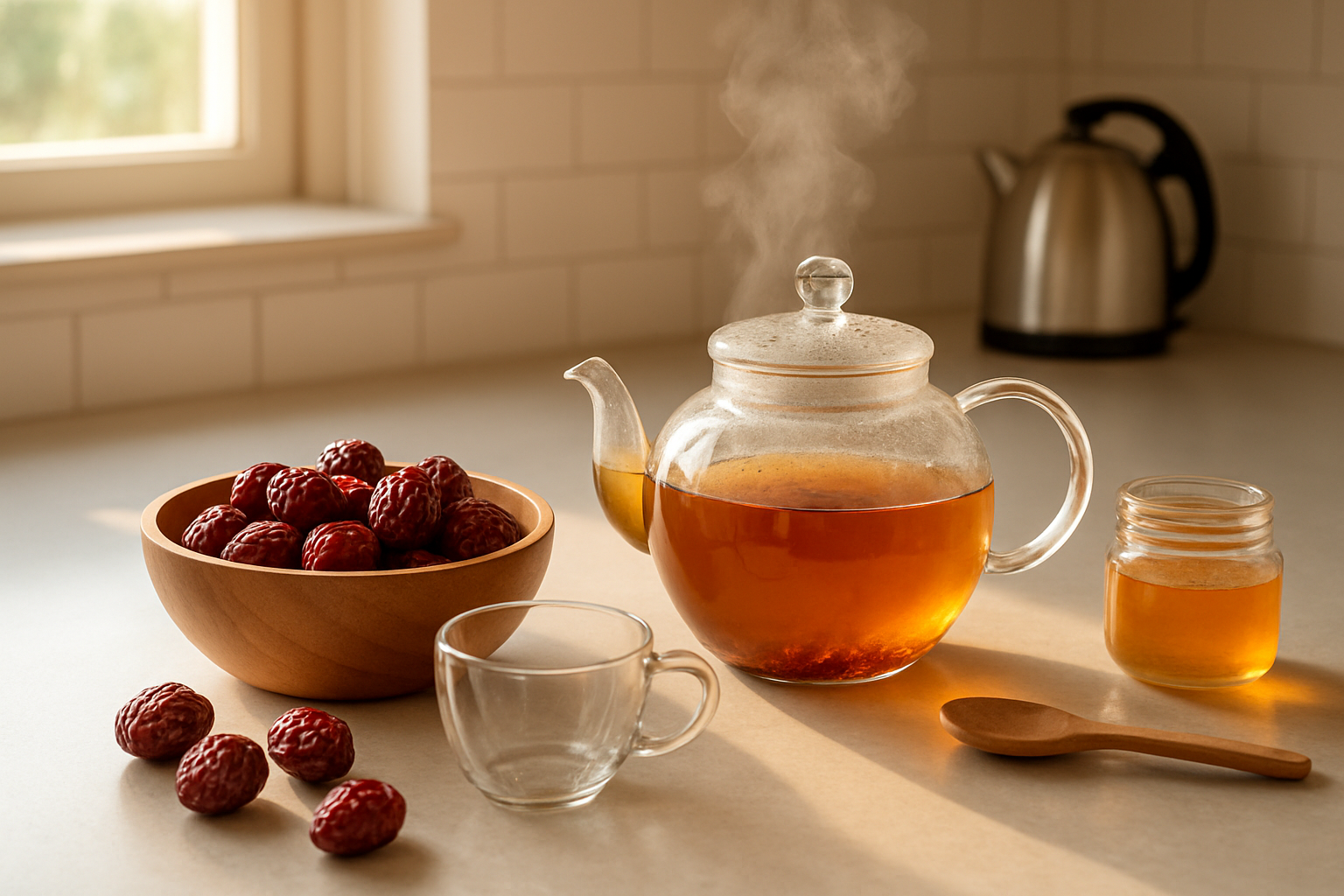
Traditional Hot Brewing Technique for Maximum Benefits
The classic hot brewing method brings out the full spectrum of jujube’s therapeutic compounds. Start with 8-10 dried jujube fruits for every two cups of water. Rinse the fruits under cool water, then slice each one in half to expose the inner flesh and release more nutrients during brewing.
Bring water to a rolling boil, then reduce heat to medium-low. Add the prepared jujube fruits and let them simmer for 15-20 minutes. The liquid should turn a beautiful amber color as the fruits release their essence. For deeper flavor and maximum nutrient extraction, allow the mixture to simmer for up to 30 minutes.
Strain the liquid through a fine mesh strainer, gently pressing the fruit pieces to extract remaining juices. The resulting tea should have a naturally sweet, slightly tangy flavor with subtle floral notes. You can reuse the same jujube fruits for a second brewing, though the flavor will be milder.
Fresh jujubes work wonderfully too, but reduce brewing time to 10-12 minutes since they release flavors more quickly. Use 12-15 fresh fruits for the same water quantity.
Cold Brewing Method for Refreshing Summer Drinks
Cold brewing creates a smoother, less astringent jujube tea perfect for hot weather. This gentle extraction method preserves delicate compounds that heat might break down while creating a naturally refreshing beverage.
Place 10-12 dried jujube fruits (lightly crushed or sliced) in a large glass jar with 3 cups of cool, filtered water. Stir gently and refrigerate for 6-8 hours or overnight. The longer steeping time allows the water to slowly extract the fruits’ sweetness and nutrients.
After steeping, strain the mixture through a fine mesh strainer lined with cheesecloth for crystal-clear tea. The result is a subtly sweet, clean-tasting beverage with a pale golden hue.
Cold-brewed jujube tea keeps well in the refrigerator for up to three days. Serve over ice with a splash of lemon juice or mint leaves for extra refreshment. You can also dilute it with sparkling water for a fizzy treat.
For quicker cold preparation, brew hot jujube tea at double strength, then pour over ice to create instant iced tea that won’t become watery as the ice melts.
Blending Jujube with Other Herbs for Enhanced Flavor
Jujube’s mild sweetness makes it an excellent base for herbal blends. Its natural compatibility with various herbs creates endless possibilities for customized wellness teas.
Calming Evening Blends:
- Jujube + chamomile + lavender for deep relaxation
- Jujube + lemon balm + passionflower for stress relief
- Jujube + valerian root for improved sleep quality
Energizing Morning Combinations:
- Jujube + ginger + lemon for digestive support
- Jujube + green tea + mint for gentle energy boost
- Jujube + rosehip + hibiscus for vitamin C power
Traditional Chinese Medicine Pairings:
- Jujube + goji berries + chrysanthemum for eye health
- Jujube + astragalus + ginseng for immune support
- Jujube + licorice root + dried orange peel for digestive harmony
When blending, use jujube as 60-70% of your mixture, with complementary herbs making up the remainder. Start with small test batches to find your preferred flavor balance. Woody herbs like astragalus need longer brewing times, while delicate flowers like chamomile should be added during the last few minutes of steeping.
Store herb blends in airtight containers away from light and moisture. Label with ingredients and mixing ratios for consistent results every time you brew.
Delicious Jujube Tea Recipe Variations
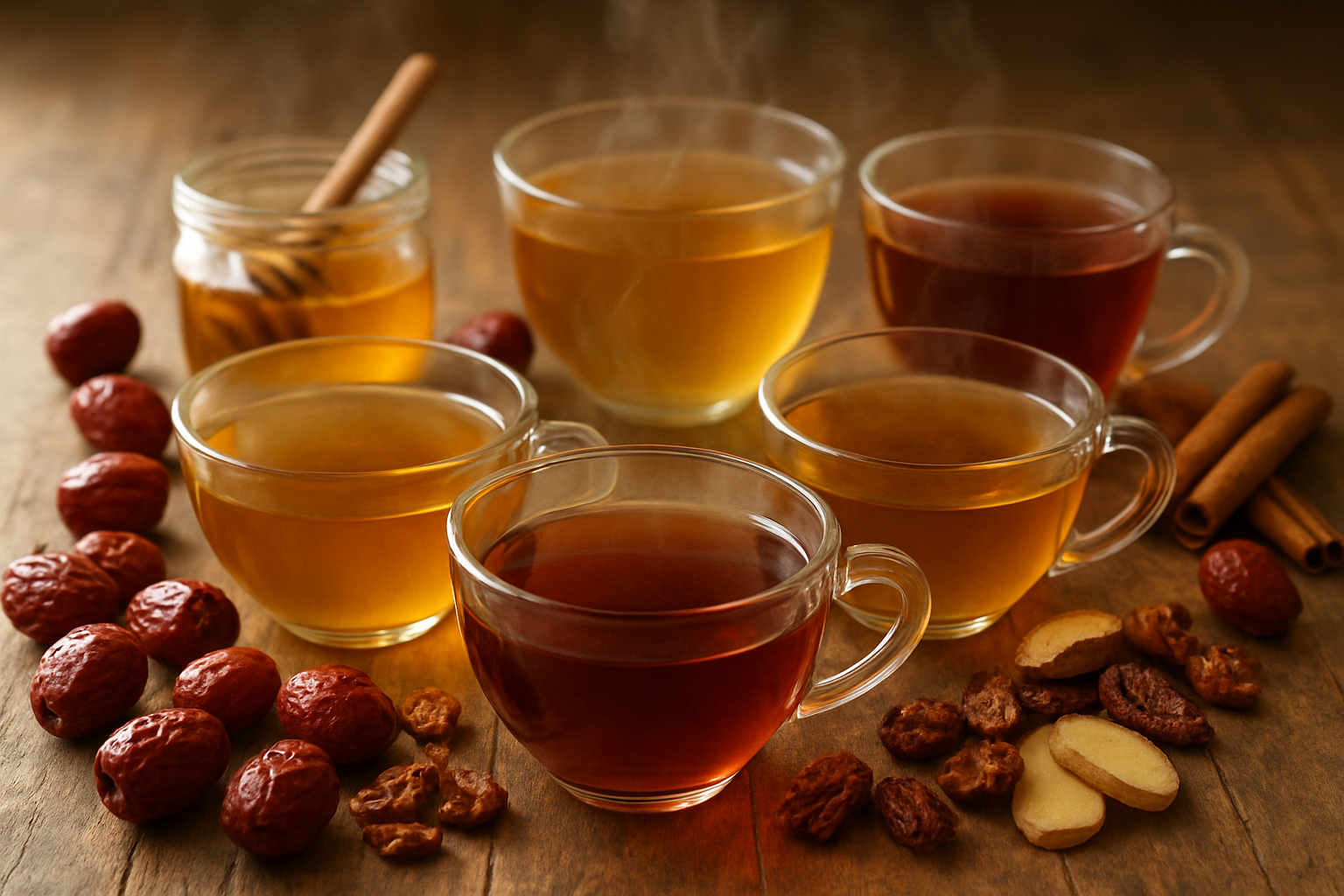
Classic Sweet Jujube Tea with Honey
The most beloved way to enjoy jujube tea combines the natural sweetness of dried jujubes with the golden richness of honey. Start by simmering 15-20 dried jujubes in 4 cups of water for 20-25 minutes until the fruits become soft and the liquid takes on a beautiful amber color. The jujubes will release their natural sugars, creating a mildly sweet base that pairs perfectly with honey’s floral notes.
Once you strain the tea, add 2-3 tablespoons of raw honey while the liquid is still warm. Raw honey works best because it retains beneficial enzymes and adds complexity to the flavor profile. You can adjust the sweetness to your preference – some people prefer just a drizzle, while others enjoy a more pronounced honey taste. This classic recipe creates a soothing drink that’s perfect for evening relaxation or when you need comfort on a cold day.
Spiced Jujube Tea with Ginger and Cinnamon
Transform your jujube tea into a warming spice blend that rivals any coffeehouse creation. Begin with the same jujube base, but add a 2-inch piece of fresh ginger (sliced thin) and two cinnamon sticks during the simmering process. The ginger brings a gentle heat and digestive benefits, while cinnamon adds warmth and helps balance blood sugar levels.
For extra depth, try adding 3-4 whole cloves and a few cardamom pods. These spices create layers of flavor that complement the subtle sweetness of jujubes beautifully. Simmer everything together for 25-30 minutes, allowing the spices to infuse completely. Strain and serve hot with a cinnamon stick as a stirrer. This variation works wonderfully during winter months or whenever you want something that warms you from the inside out.
Jujube Green Tea Fusion for Extra Antioxidants
Combining jujube with green tea creates a powerhouse drink packed with antioxidants from both ingredients. Prepare your jujube tea as usual, but use only 3 cups of water and simmer for 15 minutes. Remove from heat and immediately add 2-3 green tea bags or 2 teaspoons of loose green tea leaves. Let it steep for 3-4 minutes – any longer and the green tea becomes bitter.
The key here is timing and temperature. Green tea needs cooler water than what you use for simmering jujubes, so letting the jujube tea cool slightly before adding green tea prevents bitterness while preserving the delicate compounds in green tea. The result is a complex flavor profile where the earthy notes of green tea balance the sweetness of jujubes. Add a squeeze of lemon to brighten the flavors and boost vitamin C content.
Cooling Iced Jujube Tea with Mint
Summer calls for refreshing drinks, and iced jujube tea with mint delivers cooling relief with nutritional benefits. Prepare a concentrated jujube tea by using 25-30 dried jujubes in 3 cups of water, simmering for 30 minutes until rich and flavorful. Strain and add fresh mint leaves while the tea is still hot – about 10-12 leaves work well. The heat releases the mint’s essential oils, creating a more intense flavor.
Cool the tea to room temperature, then refrigerate for at least 2 hours. Serve over ice with fresh mint sprigs and thin lemon slices. For a festive touch, add some fresh berries or cucumber slices. The mint provides a cooling sensation that pairs beautifully with jujube’s natural sweetness, making this an ideal drink for hot afternoons or as a healthy alternative to sugary summer beverages.
| Recipe Variation | Key Ingredients | Best Time to Enjoy | Flavor Profile |
|---|---|---|---|
| Classic Sweet | Jujubes, honey | Evening/bedtime | Gentle, comforting |
| Spiced | Jujubes, ginger, cinnamon | Winter mornings | Warming, complex |
| Green Tea Fusion | Jujubes, green tea, lemon | Afternoon | Earthy, balanced |
| Iced Mint | Jujubes, mint, ice | Summer days | Fresh, cooling |
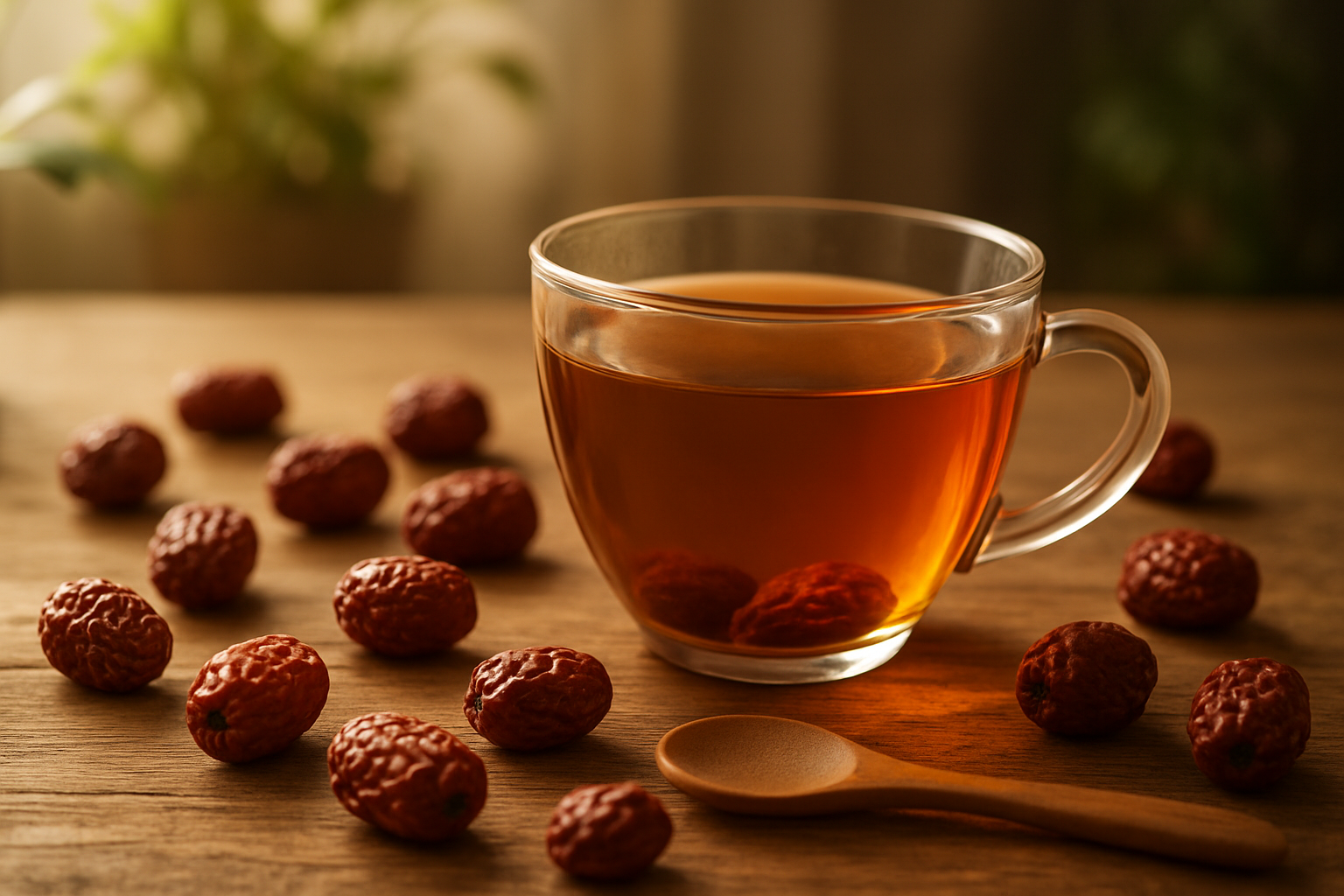
Jujube tea offers an impressive array of nutritional benefits, from its rich vitamin C content to powerful antioxidants that support immune function and overall wellness. The science backs up many traditional uses, showing potential benefits for sleep quality, digestive health, and stress management. However, like any herbal remedy, it’s important to be aware of possible side effects and interactions, especially if you’re taking medications or have existing health conditions.
Making jujube tea at home is surprisingly simple, and the variety of recipes means you can easily customize it to your taste preferences. Whether you prefer the basic dried fruit version or want to experiment with spice blends and flavor combinations, this ancient beverage can become a healthy addition to your daily routine. Start with small amounts to see how your body responds, and don’t hesitate to consult your healthcare provider if you have any concerns about adding jujube tea to your wellness regimen.







